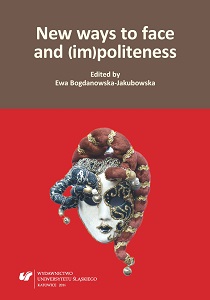On culture, face and politeness. Again
On culture, face and politeness. Again
Author(s): Maria Sifianou
Subject(s): Language studies, Language and Literature Studies, Theoretical Linguistics, Applied Linguistics, Sociolinguistics
Published by: Wydawnictwo Uniwersytetu Śląskiego
Keywords: culture; face; politeness
Summary/Abstract: Research on face is undergoing a move away from face being viewed as an individual construct to a more interactional one under the influence of discursive approaches to politeness. In this framework, it has been argued that like politeness, face is an interactional phenomenon and should be explored as such (see, e.g., Arundale, 2010; Haugh, 2010; O’Driscoll, 2011a).However, face and politeness are different kinds of concepts, the understanding of which probably necessitates different frameworks. Untangling face from (im)politeness in research is, to my mind, a necessary first step because if face and politeness are researched independently, we may be able to understand their meanings better and see their possible connections with fresh eyes (see, e.g., Haugh & Bargiela-Chiappini, 2010; O’Driscoll, 2011b; Haugh, 2013).Drawing on data from Greek, I will try to substantiate my contentions that:
• face is a relational phenomenon but not necessarily an interactional one;
• it makes sense to talk about face as an individual possession (with group repercussions), and as a pre-existing (though not static) entity with enduring aspects;
• the association between face and politeness may not be as strong as has been assumed.
Book: New ways to face and (im)politeness
- Page Range: 15-30
- Page Count: 16
- Publication Year: 2016
- Language: English
- Content File-PDF

